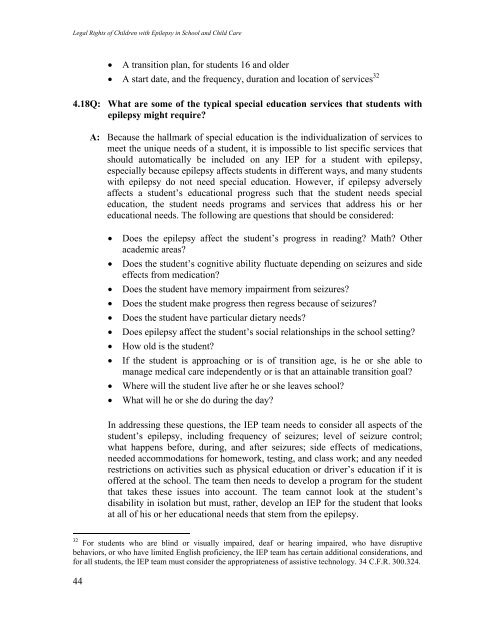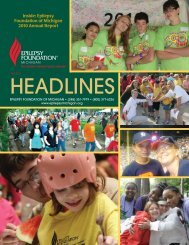Legal Rights of Children with Epilepsy in School & Child Care
Legal Rights of Children with Epilepsy in School & Child Care
Legal Rights of Children with Epilepsy in School & Child Care
You also want an ePaper? Increase the reach of your titles
YUMPU automatically turns print PDFs into web optimized ePapers that Google loves.
<strong>Legal</strong> <strong>Rights</strong> <strong>of</strong> <strong><strong>Child</strong>ren</strong> <strong>with</strong> <strong>Epilepsy</strong> <strong>in</strong> <strong>School</strong> and <strong>Child</strong> <strong>Care</strong><br />
• A transition plan, for students 16 and older<br />
• A start date, and the frequency, duration and location <strong>of</strong> services 32<br />
4.18Q: What are some <strong>of</strong> the typical special education services that students <strong>with</strong><br />
epilepsy might require?<br />
A: Because the hallmark <strong>of</strong> special education is the <strong>in</strong>dividualization <strong>of</strong> services to<br />
meet the unique needs <strong>of</strong> a student, it is impossible to list specific services that<br />
should automatically be <strong>in</strong>cluded on any IEP for a student <strong>with</strong> epilepsy,<br />
especially because epilepsy affects students <strong>in</strong> different ways, and many students<br />
<strong>with</strong> epilepsy do not need special education. However, if epilepsy adversely<br />
affects a student’s educational progress such that the student needs special<br />
education, the student needs programs and services that address his or her<br />
educational needs. The follow<strong>in</strong>g are questions that should be considered:<br />
• Does the epilepsy affect the student’s progress <strong>in</strong> read<strong>in</strong>g? Math? Other<br />
academic areas?<br />
• Does the student’s cognitive ability fluctuate depend<strong>in</strong>g on seizures and side<br />
effects from medication?<br />
• Does the student have memory impairment from seizures?<br />
• Does the student make progress then regress because <strong>of</strong> seizures?<br />
• Does the student have particular dietary needs?<br />
• Does epilepsy affect the student’s social relationships <strong>in</strong> the school sett<strong>in</strong>g?<br />
• How old is the student?<br />
• If the student is approach<strong>in</strong>g or is <strong>of</strong> transition age, is he or she able to<br />
manage medical care <strong>in</strong>dependently or is that an atta<strong>in</strong>able transition goal?<br />
• Where will the student live after he or she leaves school?<br />
• What will he or she do dur<strong>in</strong>g the day?<br />
In address<strong>in</strong>g these questions, the IEP team needs to consider all aspects <strong>of</strong> the<br />
student’s epilepsy, <strong>in</strong>clud<strong>in</strong>g frequency <strong>of</strong> seizures; level <strong>of</strong> seizure control;<br />
what happens before, dur<strong>in</strong>g, and after seizures; side effects <strong>of</strong> medications,<br />
needed accommodations for homework, test<strong>in</strong>g, and class work; and any needed<br />
restrictions on activities such as physical education or driver’s education if it is<br />
<strong>of</strong>fered at the school. The team then needs to develop a program for the student<br />
that takes these issues <strong>in</strong>to account. The team cannot look at the student’s<br />
disability <strong>in</strong> isolation but must, rather, develop an IEP for the student that looks<br />
at all <strong>of</strong> his or her educational needs that stem from the epilepsy.<br />
32 For students who are bl<strong>in</strong>d or visually impaired, deaf or hear<strong>in</strong>g impaired, who have disruptive<br />
behaviors, or who have limited English pr<strong>of</strong>iciency, the IEP team has certa<strong>in</strong> additional considerations, and<br />
for all students, the IEP team must consider the appropriateness <strong>of</strong> assistive technology. 34 C.F.R. 300.324.<br />
44








